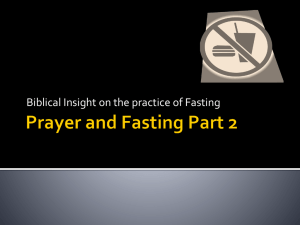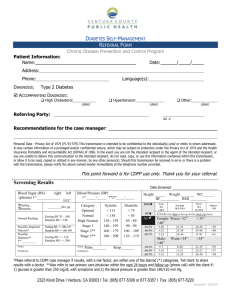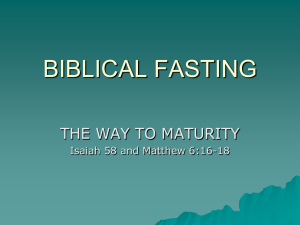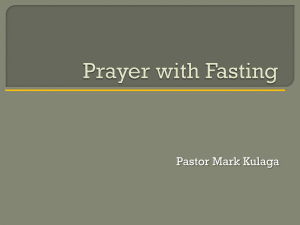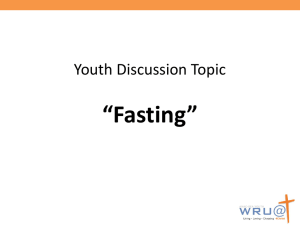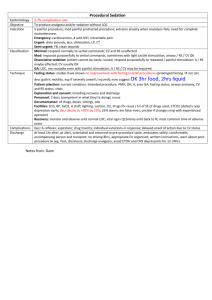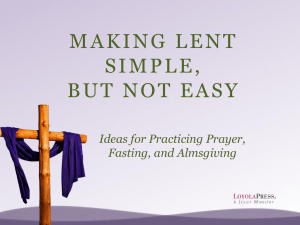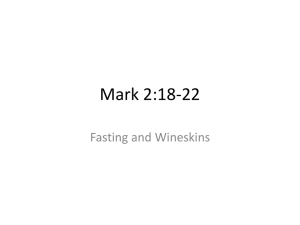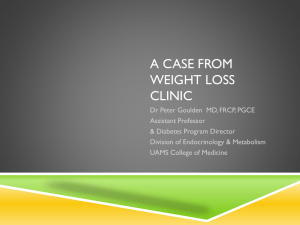Ancient Practices Week 3-Fasting-BETTER
advertisement
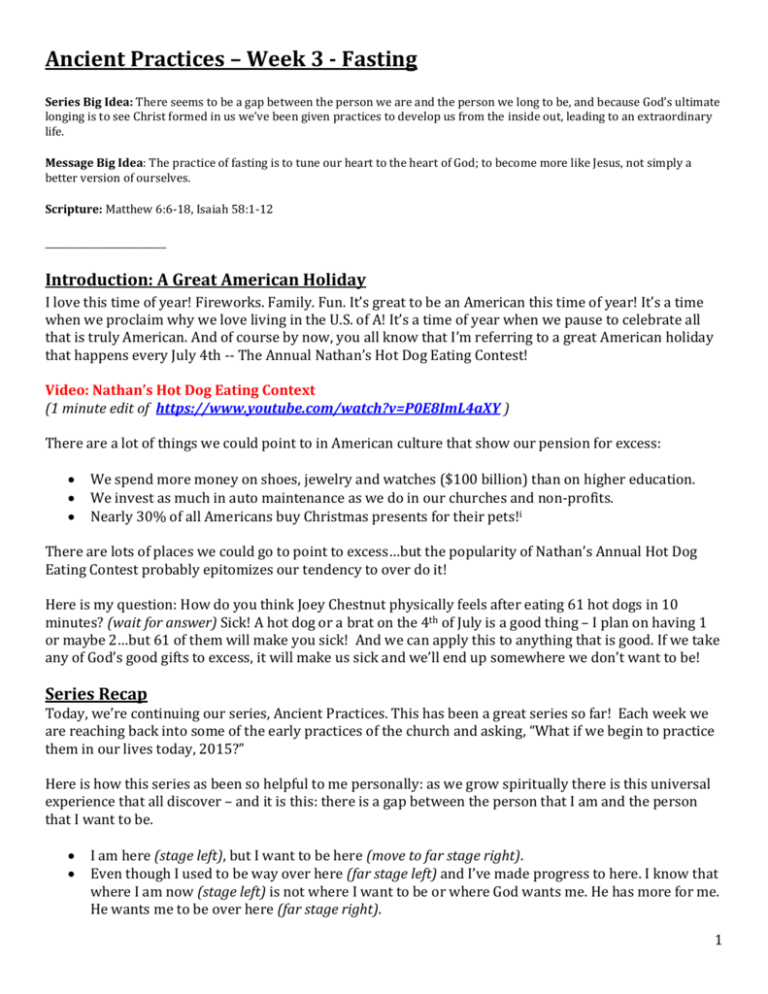
Ancient Practices – Week 3 - Fasting Series Big Idea: There seems to be a gap between the person we are and the person we long to be, and because God’s ultimate longing is to see Christ formed in us we’ve been given practices to develop us from the inside out, leading to an extraordinary life. Message Big Idea: The practice of fasting is to tune our heart to the heart of God; to become more like Jesus, not simply a better version of ourselves. Scripture: Matthew 6:6-18, Isaiah 58:1-12 __________________________ Introduction: A Great American Holiday I love this time of year! Fireworks. Family. Fun. It’s great to be an American this time of year! It’s a time when we proclaim why we love living in the U.S. of A! It’s a time of year when we pause to celebrate all that is truly American. And of course by now, you all know that I’m referring to a great American holiday that happens every July 4th -- The Annual Nathan’s Hot Dog Eating Contest! Video: Nathan’s Hot Dog Eating Context (1 minute edit of https://www.youtube.com/watch?v=P0E8ImL4aXY ) There are a lot of things we could point to in American culture that show our pension for excess: We spend more money on shoes, jewelry and watches ($100 billion) than on higher education. We invest as much in auto maintenance as we do in our churches and non-profits. Nearly 30% of all Americans buy Christmas presents for their pets!i There are lots of places we could go to point to excess…but the popularity of Nathan’s Annual Hot Dog Eating Contest probably epitomizes our tendency to over do it! Here is my question: How do you think Joey Chestnut physically feels after eating 61 hot dogs in 10 minutes? (wait for answer) Sick! A hot dog or a brat on the 4th of July is a good thing – I plan on having 1 or maybe 2…but 61 of them will make you sick! And we can apply this to anything that is good. If we take any of God’s good gifts to excess, it will make us sick and we’ll end up somewhere we don’t want to be! Series Recap Today, we’re continuing our series, Ancient Practices. This has been a great series so far! Each week we are reaching back into some of the early practices of the church and asking, “What if we begin to practice them in our lives today, 2015?” Here is how this series as been so helpful to me personally: as we grow spiritually there is this universal experience that all discover – and it is this: there is a gap between the person that I am and the person that I want to be. I am here (stage left), but I want to be here (move to far stage right). Even though I used to be way over here (far stage left) and I’ve made progress to here. I know that where I am now (stage left) is not where I want to be or where God wants me. He has more for me. He wants me to be over here (far stage right). 1 There is a gap between the person that I am right now and the person that I want to be. And what we are discovering is that these “ancient practices” help propel us forward in our spiritual journey to close the gap between where I am and where I want to be. In this series, so far we’ve talked about the ancient practice of baptism and the ancient practice of Sabbath. Today’s ancient practice is one that I believe is by far the least understood but has by far the greatest power to close the gap between where you are (stage left) and where you want to be (far stage right). It’s the practice of fasting. The Practice of Fasting Just curious, how many of you have ever gone on diet of any kind? Raise your hand… Weight Watchers? South Beach Diet? Zone Diet? Jennifer Aniston uses it…so it must be good! Remember the Atkins diet - where you could eat all the bacon you want? I’ve been on that diet my whole adult life! Now, how many of you have ever abstained from food for a spiritual purpose? The best definition for the practice of fasting is simply that: “Abstaining from food for spiritual purposes.” It’s not dieting; it’s not a hunger strike. It’s abstaining from food for spiritual purposes. Because fasting, unlike prayer or Bible reading is so unfamiliar, let’s start with some basics. There are three types of fasting: 1. There is the “Common Fast” – That is fasting from all food but still drinking water. 2. There is also the “Partial Fast” – That is fasting from some foods. In the Old Testament we read about Daniel who for spiritual purposes ate no meat or “fine foods” but only vegetables. That is a partial fast. I have one kid who eats everything but vegetables, but that has nothing to do with fasting. A partial fast can also be abstaining from all food, but only drinking juices. I know people who have done that for spiritual purposes. 3. Lastly, there is an “Absolute Fast” – That is a fast where you have no food and no water. And again, you do it for spiritual purposes. In the Bible we see that fasting; whether it is a common fast, partial fast, or an absolute fast, is something that can be done by individuals in private OR in community with a small group or even a whole church! Historical Practice of Fasting But what is most interesting to me about fasting is how Jesus talks about it. (On Screen: Matthew 6:16-18 with the two phrases “When you fast” underlined) In Matthew 6 Jesus teaches on fasting and twice uses the phrase, “When you fast…” What jumps out is that Jesus just assumed that we would fast. Jesus mentions fasting in the same context as praying and giving. He assumes that fasting would be a normative Christian practice. So what happened? Well, for the first 1900 years of Christianity fasting was a very common practice among believers. Every bit as common as praying, giving and more popular than Bible reading because the average person didn’t even have a Bible to read until the Gutenberg Bible was published in 1454. 2 (If possible, we’d love to have this “History of Fasting” depicted graphically with a timeline) Fasting has historically always been a part of the Christian life. If we rewind history, we know that sometime around 128 AD, a journalist by the name of Aristide explained to Emperor Hadrian how Christians lived by saying: “When someone is poor among them who has need of help, they fast for two or three days, and they have the custom of sending that person the food which they had prepared for themselves.” 400 years later, you have the great Christian theologian Augustine encouraging believers to fast saying, “Fasting cleanses the soul, raises the mind, subjects one’s flesh to the spirit, renders the heart contrite and humble...” 1000 years later into the 1500’s the reformers like Calvin, Luther and Zwingli assumed fasting as a practice of Christians. Calvin said, “Whenever supplication is to be made to God on any important occasion, it is befitting to appoint a period for fasting and prayer.” Even our founding forefathers, many who were believers like George Washington, practiced fasting. Our first president wrote in his journal about participating in a day of fasting when the British Parliament ordered an embargo on the Port of Boston in 1774. But then about 200 years ago something changed. And it changed dramatically! Richard Foster who wrote a great book on this topic, Celebration of Discipline, said, “I could not find a single book published on the subject of Christian fasting from 1861-1954.” Almost 100 years! So the question we have to ask ourselves is, “Why did it change? What happened that created such a huge departure from what had been a common practice for so long?” Well there are 2 major reasons why our world lost the practice of fasting. First off, fasting developed a bad reputation as being an outward show that was disconnected from inward transformation. Rather than being seen as an ancient practice that helps close the gap between who we are and who we want to be, fasting began to be viewed as a misguided attempt to earn good standing with God. Author Lynne Baab, in her book Joy Together: Spiritual Practices for Your Congregation, says that fasting became seen as a way: “…of earning God’s approval, trying to prove to God that the Christian was worthy and righteous…In the nineteenth century, Christians in Western countries saw that some of those unhealthy and unbiblical emphases continued to shape the practice of fasting, so they evidently came to believe that fasting couldn’t function as a healthy spiritual discipline.” It didn't happen overnight, but slowly, the more society began to view fasting as something done to gain favor with God or prove how holy or religious a person was (the opposite of being saved by grace)… the more people rejected and abandoned this ancient practice. Another reason we lost the practice of fasting is due in large part to the rise of consumerism in our culture. Consumerism has, at its core, an emphasis on meeting any and all needs a person might dream up. Consumerism has created a cultural phenomenon where satisfying every human appetite is seen as a positive virtue. Understand, in generations past, greater value was placed on withholding satisfaction of certain desires for a greater purpose. Baab goes on to say that: 3 “It is no accident that fasting fell out of favor in the nineteenth and twentieth centuries, around the same time that advertisements for every conceivable item began to escalate…Denying ourselves anything for any reason lost its attractiveness.” In a world obsessed with obtaining everything imaginable, it’s easy to see how the ancient practice of fasting…of denying oneself…became an undesirable practice…as something outdated that people don’t really do anymore. So do we really need to recover this ancient practice? Is this really something we should engage in again? VIDEO: Interview with John Wentz ● Question: How did you get started with fasting as a practice in your life? ● Question: What made you want to do a 40 day fast? ● Question: What was it like doing a 40-day fast? ● Question: What were the benefits to you spiritually? ● Question: What challenge would you give to people who are thinking about integrating this practice into their lives? Benefits of Fasting If these ancient practices are given to us to develop us from the inside out… to help me close the gap between who I am and who I want to be… how does fasting do that? What are the benefits? How does fasting help move me from here (stage left) to there (pointing to far stage right)? Well, I believe fasting helps us become who we want to be by focusing in on 2 different aspects of the “self.” That might sound a little odd because fasting seems like the kind of thing to get us stop focusing on ourselves, but here is what I mean... Fasting helps us develop the muscle of Self Control. It’s literally like working out and building a muscle most of us have forgotten that we have. Think about it…this is something we hear very little about in our world. People seldom encourage each other to demonstrate more self-control. But honestly, who wants to be known as someone with no control over his or her human appetites? Nobody, right? But, that’s exactly the kind of people our culture shapes us…and even encourages us…to become. Here’s the thing (Go to stage right). I want to be the kind of person who doesn’t fall into the trap of making impulse purchases that wreck my finances. I want to be the kind of person who doesn’t lose control at the buffet line and end up harming my health. I want to be the kind of person who doesn’t blurt out hurtful words that damage my relationships. I want to be the kind of person who exercises self-control. And fasting is a discipline that can help train my body and my mind to grow in this sometimes-foreign quality. Fasting is an ancient practice that can help me go from there (Pointing to stage left) to here (Stage right). It’s a workout that helps us learn how to live a life marked by the ability to live with moderation and restraint. Fasting helps us develop the muscle of self-control. 4 And another way fasting helps develop me from who I am to who I want to be is that it teaches me to become Self Forgetful. If you have a Bible with you or have a Bible app on your phone, turn to the Old Testament book of Isaiah starting at the beginning of chapter 58. Here God says some pretty powerful stuff about fasting starting in verse 2: “For day after day they seek me out; they seem eager to know my ways, as if they were a nation that does what is right and has not forsaken the commands of its God. They ask me for just decisions and seem eager for God to come near them. ‘Why have we fasted,’ they say, ‘and you have not seen it? Why have we humbled ourselves, and you have not noticed?’ “Yet on the day of your fasting, you do as you please and exploit all your workers. Your fasting ends in quarreling and strife, and in striking each other with wicked fists. You cannot fast as you do today and expect your voice to be heard on high.” (Isaiah 58: 2-4) Now let me pause here for a second. If you’ve ever fasted before and experienced that crazy hungry feeling you get sometimes…or if you’re like me and fasting causes you to just get really cranky…then you can sympathize with the Israelites here, right? But seriously, God is rebuking the Israelites for using fasting as a way to try to manipulate him. They’re upset about not getting the answers they want from him, but they don’t care at all about the way they are mistreating each other. God won’t stand for that. So he decides to set the record straight on what he wants fasting to be about. He continues: “Is not this the kind of fasting I have chosen: to loose the chains of injustice and untie the cords of the yoke, to set the oppressed free and break every yoke? Is it not to share your food with the hungry and to provide the poor wanderer with shelter— when you see the naked, to clothe them, and not to turn away from your own flesh and blood?” (Isaiah 58: 67) Instead of trying to use fasting to control God, he wants us to forget ourselves and use fasting as an opportunity to enter into the poverty of others. Fasting gives us an opportunity to become self-forgetful and engage the needs of those around us. In the early church, when someone was poor or needed help, Christ-followers would often fast for 2 or 3 days and send that person the food they had prepared for themselves. Fasting was something people practiced in order to share with the poor.ii In his commentary on Isaiah, John Oswalt says: “God calls for behavior that is self-forgetful and outward-looking. Let acts of self-denial be for the sake of others and not for one’s own sake. Work ‘to set the oppressed free.’ Eat less in order to have food to give to the ‘hungry.’ Wear less-expensive clothes in order to clothe the naked. This is the kind of cessation and self-affliction God has chosen.” This idea flies in the face of the consumerism that’s so successfully pushed fasting out of our human psyche. But God has given us this ancient practice to help us live in a different way. Through fasting we’re able to humble ourselves and love our neighbors with an actionable love that gives us the opportunity to make a difference in a real, tangible way. Challenge: Fast 5 So what now? If fasting is an important practice that we need to rediscover, how do we move from just knowing about it to actually practicing it? Well it’s a pretty simple idea… we’re going to fast! We want to invite everyone to join together as a church, across all 13 campuses and fast together. Here’s the plan… We’re going to take part in a partial fast where we abstain from some foods or all foods and just drink juices. We’re going to do this together starting after lunch on Wednesday through lunch on Thursday. Listen, this is a challenge we’d love for everyone to join in on. So much so that we created a response card so you can commit to fasting with us. I understand that some of us have certain dietary restrictions that make it difficult to fast, which is why we’ve chosen to take on a partial fast so that everyone can be in on it at whatever level they can be physically. On the card you’ll see that there is a second dimension to this fast. We want to challenge everyone, in response to what we just read in Isaiah 58, to commit to identifying with those who are hungry by donating whatever you would normally have spent on Wednesday dinner and Thursday breakfast to Frontline’s Face the Children program. (Pictures from Face the Children) Frontline is our partner ministry in the Philippines and through Face the Children they are helping to feed kids who are living on the city streets. The great thing is, our dollars stretch really far there…just $2 feeds 1 kid for a whole day…literally 3 meals and a snack. This is an incredible opportunity to make a tangible difference in the life of a child in critical need in the Philippines. So on your response card, there’s a place to indicate how much you plan to give and we’ve set up a website where you can donate your dinner and breakfast money to help feed kids. We’ll collect all our meal money and make one big donation to Face the Children on behalf of our community. We have a very real chance for each of us to exercise our muscle of Self Control and to learn how to become Self Forgetful. Take a look at these two images on the screen. (Photo of Nathan’s Hot Dog Eating Contest and of Face the Children) I’ll leave it to you: “What do you want your life to be about?” God has given us this ancient practice of fasting to help us grow from where we are to where we want to be. https://www.psychologytoday.com/blog/sex-drugs-and-boredom/201207/do-americans-consumetoo-much ii This definition is adapted from the definition given by Bruce Wilkinson in Set Apart: Discovering Personal Victory Through Holiness (Sisters, OR: Multnomah Publishers, 1998, 2003), 228. Quoted in Lynn M. Babb, Joy Together: Spiritual Practices for Your Congregation (Louisville: Westminster John Knox Press, 2012), 45, Footnote 4. i 6
